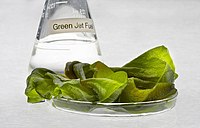
Photo from wikipedia
In this contribution, biochar from municipal sludge was used as a novel matrix for the synthesis of a series of calcium-based heterogeneous catalysts toward biodiesel production. Their catalytic activity was… Click to show full abstract
In this contribution, biochar from municipal sludge was used as a novel matrix for the synthesis of a series of calcium-based heterogeneous catalysts toward biodiesel production. Their catalytic activity was investigated in terms of catalyst loading and calcination temperature during preparation, in addition to the transesterification parameters including the methanol/oil molar ratio, reaction time, and catalyst amount. The highest biodiesel yield up to 93.77% was achieved with the 30Ca/A-SBC-700, and it maintained as high as 84.9% even after 10 cycles of a consecutively alternating catalysis and regeneration process. It was revealed that the porous municipal sludge biochar and autologous SiO2 were accountable for the superior stability of the present catalyst. This work may provide a new path to value-added valorization of sludge waste and also a renewable and efficient catalyst for biodiesel production at a low cost.
Journal Title: ACS Omega
Year Published: 2020
Link to full text (if available)
Share on Social Media: Sign Up to like & get
recommendations!